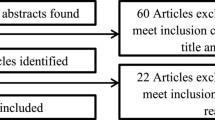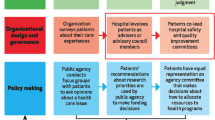Abstract
Background Qualitative evidence on patients’ perceptions of pharmacist-managed diabetes services (PMDSs) is limited. Objective To explore patients’ perceptions of PMDSs Setting Patients being cared for in the outpatient settings in Singapore. Methods This focus group included patients who were diagnosed with type 2 diabetes, spoke either English or Mandarin, attended PMDSs for at least 6 months in the ambulatory care or community settings, and were at least 21 years of age. Patients with cognitive impairments or mobility issues were excluded. Thematic analysis of transcribed audio recordings was undertaken. Main outcomes measure Patients’ care experiences with PMDSs. Results A total of 26 patients from two outpatient ambulatory care clinics and three retail pharmacies were assembled into four focus groups based on the care setting. Four themes abstracted from focus group data illustrated patients’ perspectives on PMDSs in fulfilling their health needs, delivery and quality of service, changes attributed to the service, and suggestions for improvement of service. The patients highlighted that PMDSs fulfilled their need for information on diabetes. They also felt comfortable speaking to the pharmacists about their health, and they appreciated the role of the pharmacists as healthcare professionals. Furthermore, the patients reported better diabetes-related self-empowerment via increased medication knowledge and lifestyle modification. Some of the patients noted that medication adherence and glycemic control had improved. Suggestions to improve PMDSs were minimal. Conclusions Overall, patients with type 2 diabetes had positive perceptions of PMDSs regardless of the care settings.
Similar content being viewed by others
References
Hepler CD, Strand LM. Opportunities and responsibilities in pharmaceutical care. Am J Hosp Pharm. 1990;47:533–43.
Chisholm-Burns MA, Kim Lee J, Spivey CA, Slack M, Herrier RN, Hall-Lipsy E, et al. US pharmacists’ effect as team members on patient care: systematic review and meta-analyses. Med Care. 2010;48:923–33.
International Diabetes Federation. IDF diabetes atlas. 7th ed. Brussels: Belgium; 2015. pp 1–141
Chan JC, Malik V, Jia W, Kadowaki T, Yajnik CS, Yoon KH, et al. Diabetes in Asia: epidemiology, risk factors, and pathophysiology. JAMA. 2009;301:2129–40.
Epidemiology and Disease Control Division. Ministry of Health. National health survey. Singapore; 2004.
IDF Western Pacific members: Singapore. International Diabetes Federation. https://www.idf.org/our-network/regions-members/western-pacific/members/113-singapore.html. Accessed 18 Jan 2018.
Seuring T, Archangelidi O, Suhrcke M. The economic costs of type 2 diabetes: a global systematic review. Pharmacoeconomics. 2015;33:811–31.
Sheetz MJ, King GL. Molecular understanding of hyperglycemia’s adverse effects for diabetic complications. JAMA. 2002;288:2579–88.
Bjerrum L, Rosholm JU, Hallas J, Kragstrup J. Methods for estimating the occurrence of polypharmacy by means of a prescription database. Eur J Clin Pharmacol. 1997;53:7–11.
Bjerrum L, Sogaard J, Hallas J, Kragstrup J. Polypharmacy: correlations with sex, age and drug regimen. A prescription database study. Eur J Clin Pharmacol. 1998;54:197–202.
van Bruggen R, Gorter K, Stolk RP, Zuithoff P, Klungel OH, Rutten GE. Refill adherence and polypharmacy among patients with type 2 diabetes in general practice. Pharmacoepidemiol Drug Saf. 2009;18:983–91.
Jacubeit T, Drisch D, Weber E. Risk factors as reflected by an intensive drug monitoring system. Agents Actions Suppl. 1990;29:117–25.
White JR, Campbell RK. Dangerous and common drug interactions in patients with diabetes mellitus. Endocrinol Metab Clin North Am. 2000;29:789–802.
Rambhade S, Chakarborty A, Shrivastava A, Patil UK, Rambhade A. A survey on polypharmacy and use of inappropriate medications. Toxicol Int. 2012;19:68–73.
Ahola AJ, Groop PH. Barriers to self-management of diabetes. Diabet Med. 2013;30:413–20.
Wubben DP, Vivian EM. Effects of pharmacist outpatient interventions on adults with diabetes mellitus: a systematic review. Pharmacotherapy. 2008;28:421–36.
Siaw MYL, Ko Y, Malone DC, Tsou KYK, Lew YJ, Foo D, et al. Impact of pharmacist-involved collaborative care on the clinical, humanistic and cost outcomes of high-risk patients with type 2 diabetes (IMPACT): a randomized controlled trial. J Clin Pharm Ther. 2017;42:475–82.
American College of Clinical Pharmacy. ACCP Ambulatory care pharmacist’s survival guide. 3rd ed. Lenexa: Kansas; 2013.
Cranor CW, Bunting BA, Christensen DB. The Asheville project: long-term clinical and economic outcomes of a community pharmacy diabetes care program. J Am Pharm Assoc (Wash). 2003;43:173–84.
Maddigan SL, Majumdar SR, Guirguis LM, Lewanczuk RZ, Lee TK, Toth EL, et al. Improvements in patient-reported outcomes associated with an intervention to enhance quality of care for rural patients with type 2 diabetes: results of a controlled trial. Diabetes Care. 2004;27:1306–12.
Garrett DG, Martin LA. The Asheville project: participants’ perceptions of factors contributing to the success of a patient self-management diabetes program. J Am Pharm Assoc (Wash). 2003;43:185–90.
Twigg MJ, Poland F, Bhattacharya D, Desborough JA, Wright DJ. The current and future roles of community pharmacists: views and experiences of patients with type 2 diabetes. Res Social Adm Pharm. 2013;9:777–89.
Wong LP. Focus group discussion: a tool for health and medical research. Singap Med J. 2008;49:256–60.
LaVela SL, Gallan AS. Evaluation and measurement of patient experience. Patient Exp J. 2014;1:28–36.
Al-Abri R, Al-Balushi A. Patient satisfaction survey as a tool towards quality improvement. Oman Med J. 2014;29:3–7.
Liamputtong P. Focus group methodology: principle and practice. SAGE Publications: London; 2011. pp. 1–212
Braun V, Clarke V. Using thematic analysis in psychology. Qual Res Psychol. 2006;3:77–101.
Ostbye T, Yarnall KS, Krause KM, Pollak KI, Gradison M, Michener JL. Is there time for management of patients with chronic diseases in primary care? Ann Fam Med. 2005;3:209–14.
Barnes CS, Ziemer DC, Miller CD, Doyle JP, Watkins C Jr, Cook CB, et al. Little time for diabetes management in the primary care setting. Diabetes Educ. 2004;30:126–35.
Boren SA. AADE7TM self-care behaviors: systematic reviews. Diabetes Educ. 2007;33:866-71.
Mitchell B, Armour C, Lee M, Song YJ, Stewart K, Peterson G, et al. Diabetes medication assistance service: the pharmacist’s role in supporting patient self-management of type 2 diabetes (T2DM) in Australia. Patient Educ Couns. 2011;83:288–94.
Antoine SL, Pieper D, Mathes T, Eikermann M. Improving the adherence of type 2 diabetes mellitus patients with pharmacy care: a systematic review of randomized controlled trials. BMC Endocr Disord. 2014;14:53.
Kelly DV, Young S, Phillips L, Clark D. Patient attitudes regarding the role of the pharmacist and interest in expanded pharmacist services. Can Pharm J (Ott). 2014;147:239–47.
Falkenberg MG, Elwing BE, Goransson AM, Hellstrand BE, Riis UM. Problem oriented participatory education in the guidance of adults with non-insulin-treated type-II diabetes mellitus. Scand J Prim Health Care. 1986;4:157–64.
Bastiaens H, Sunaert P, Wens J, Sabbe B, Jenkins L, Nobels F, et al. Supporting diabetes self-management in primary care: pilot-study of a group-based programme focusing on diet and exercise. Prim Care Diabetes. 2009;3:103–9.
Khunti K, Gray LJ, Skinner T, Carey ME, Realf K, Dallosso H, et al. Effectiveness of a diabetes education and self management programme (DESMOND) for people with newly diagnosed type 2 diabetes mellitus: three year follow-up of a cluster randomised controlled trial in primary care. BMJ. 2012;344:e2333.
Tang TS, Funnell MM, Noorulla S, Oh M, Brown MB. Sustaining short-term improvements over the long-term: results from a 2-year diabetes self-management support (DSMS) intervention. Diabetes Res Clin Pract. 2012;95:85–92.
Khoo HS, Lim YW, Vrijhoef HJM. Primary healthcare system and practice characteristics in Singapore. Asia Pac Fam Med. 2014;13:8.
Acknowledgements
The authors would like to thank Soo Im Ong and Evonne Yanqun Lee for their administrative support.
Funding
This study was funded by the Health Services Research Competitive Research Grant from Ministry of Health, Singapore (HSRG/11MAY/016).
Conflicts of interest
The authors declare that they have no conflicts of interest.
Author information
Authors and Affiliations
Corresponding author
Rights and permissions
About this article
Cite this article
Siaw, M.Y.L., Toh, J.H. & Lee, J.YC. Patients’ perceptions of pharmacist-managed diabetes services in the ambulatory care and community settings within Singapore. Int J Clin Pharm 40, 403–411 (2018). https://doi.org/10.1007/s11096-018-0591-2
Received:
Accepted:
Published:
Issue Date:
DOI: https://doi.org/10.1007/s11096-018-0591-2




